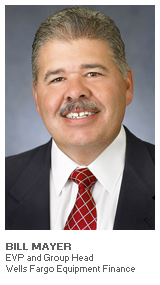
Last October, Equipment Finance Advisor sat down with John McQueen, who earlier in 2014 had announced his plans to retire from the top spot at Wells Fargo Equipment Finance (WFEF). At that time, McQueen’s replacement had yet to be named. In the week that followed our interview, Wells Fargo announced that Bill Mayer would succeed McQueen at the beginning of 2015.
To present the whole story, Equipment Finance Advisor jumped at the opportunity to speak with Mayer, a seasoned commercial finance executive in his own right. Mayer, who joined the Wells Fargo organization in September of 2002, assumed his new role at WFEF after having worked in the bank’s Wholesale Credit group and at Wells Fargo Capital Finance (WFCF), which offers a vast array of asset-based and other secured lending products. But to think of Mayer as a “credit guy” stepping into a bigger role would prove to be a mistake and Mayer states plainly he’s no stranger to equipment finance.
“People out there may be wondering,” Mayer begins, “’who is this guy coming out of credit now running a big business like Wells Fargo Equipment Finance?’ At Wells Fargo Capital Finance, I was running seven businesses which, on a combined basis, were making north of $350 million of pre-tax income and I was responsible for 500 to 600 full-time employees.”

But to begin at the beginning, the Penn State graduate began his professional career in public accounting – a career path that was short lived. He recalls, “I quickly took a job at GE Capital where I spent nearly 14 years in a long and diverse career. At a functional level, I headed sales, underwriting, operations and I even did some M&A work in the United Kingdom. I worked with several different groups at GE, from their LBO group to their commercial finance group and even their retailer financial services group which provided private label consumer credit cards.”
The Ability to ‘Fix and Grow’
Based on the broad experience acquired at GE Capital, Mayer garnered the reputation as an executive with the skill to “fix and grow” broken or non-thriving businesses. This ability led to an opportunity at Wells Fargo.
“I actually joined what was then known as Foothill Capital working with one of its co-founders John Nickoll. I also worked with Pete Schwab and Henry Jordan, who headed up what eventually became Wells Fargo Capital Finance. I joined to lead their retail finance group which at the time needed both fixing and growing.”
And grow it did. Mayer notes, “When I joined in September 2002, retail finance was in the red for the fiscal year 2002. By the time I moved out of my role at Wells Fargo Capital Finance, that group made in excess of $150 million in pre-tax income … so there’s a bit of a growth story there.”
As with GE Capital, Mayer’s skills did not go unnoticed by the executives at Wells Fargo Capital Finance. In time, Mayer worked with WFCF’s trade capital group, its small ticket asset-based lending group then known as Wells Fargo Business Credit, its receivables funding group that specializes in staffing and government receivables, and its purchase order finance group. When WFCF ventured into the junior capital Tranche B lending space in 2010, Mayer was selected to launch that group as well.
Mayer says, “In May 2011, I was approached by Dave Hoyt who ran Wholesale Banking and his chief credit officer, Dave Weber to work within the Wholesale credit organizations. They knew I had a strong credit mindset and that I was also commercially focused. At the end of the day, it’s about doing the right thing for our customers to get deals consummated and they thought I could bring a nice balance to that group.”
On a personal level, the opportunity provided Mayer with the ability to gain even greater exposure to all wholesale lines of businesses. He notes, “Not only did I have chief credit officer responsibility for Capital Finance, but I also picked up WFEF and that gave me the opportunity to work with John McQueen and Andrew Rupprecht and many of the people there.”
In addition to WFEF, Mayer also gained exposure to the workings of the Government and Institutional Banking business; the Commercial Bank; the Commercial Operating Asset Finance group (COAF); and the Credit Resolution Group.
“My work with COAF gave me more exposure to equipment finance and the Commercial Bank is one of our most important bank channel partners at Wells Fargo. I was in a great position to work with a number of different business lines, but most importantly, I got to develop my relationship with WFEF.”
And, Mayer notes, that’s a good thing. “They are a really good team with a great deal of experience. I really enjoy the variety of deals they work on. And, it’s a great business with a terrific platform. It’s one of those things that you ask yourself, ‘what’s not to like?’”
WFEF: No ‘Heavy Lifting’ Required
Mayer takes a moment to make an important distinction. He explains, “In my prior roles, I found myself in the middle of situations where something was broken or wasn’t growing or needed some type of major overhaul. That’s not the case with WFEF. It’s firing on all cylinders and it’s growing. John has done a tremendous job at the helm and we’ll most likely show somewhere in the area of 10% growth in new business volume. When you look at the industry and consider the economy, those are great numbers. Going forward, we may tweak a few things here and there, but in this situation, I don’t have to worry about any heaving lifting.”
As for the near-term future of the equipment finance industry as a whole, Mayer says, “At a very high level, I am optimistic. When you look at the indicators, many economists are calling for the economy to grow in the 3% range. And the ELFA sees the industry growing at a 6% clip in 2015. When I look at WFEF’s historical performance and I consider our broad and diverse product and services offerings, I don’t see why we can’t grow at 105% to 125% of the industry. For 2015, that takes us to that 9% to 10% range."
Continued on Page 2...